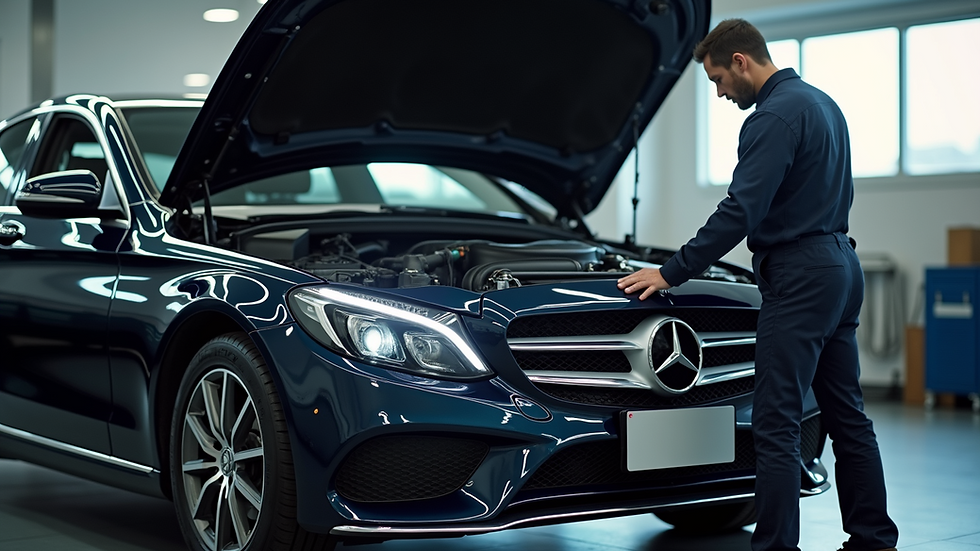Understanding Common Mercedes-Benz SRS System Issues
- Sprinter City Expert

- Sep 15, 2025
- 4 min read
When it comes to the safety and reliability of your Mercedes-Benz, understanding the Supplemental Restraint System (SRS) is essential. The SRS is designed to deploy airbags and ensure occupant safety in the event of a collision. However, just like any vehicle system, it can experience problems. This blog post will delve into the common issues associated with the Mercedes-Benz SRS system, helping you understand what to look out for and how to address these problems.
What is the Mercedes-Benz SRS?
The Mercedes-Benz SRS, or Supplemental Restraint System, plays a critical role in vehicle safety. It works in conjunction with seat belts to protect passengers during a crash. The system includes airbags, sensors, and control modules that work together to detect accidents and deploy airbags accordingly.

Common Issues with the Mercedes-Benz SRS
As advanced as the SRS in Mercedes-Benz vehicles may be, several common issues can arise. Not all of these require immediate attention, but understanding them can help you maintain your vehicle's safety systems.
1. SRS Warning Light Activation
One of the most common issues is the activation of the SRS warning light on the dashboard. This light is your vehicle's way of telling you there is a problem with the SRS system. Possible reasons for this warning include:
Faulty sensors
Disconnected or damaged wiring
Malfunctioning control modules
If the SRS warning light is illuminated, it's essential to address it promptly. Ignoring this warning could mean your airbags won't deploy in an accident.
2. Faulty Airbag Sensors
Airbag sensors play a crucial role in determining when to deploy the airbags. These sensors can fail due to wear and tear, exposure to moisture, or poor electrical connections. If the sensors are faulty, they may either fail to deploy during an accident or deploy accidentally, which can be dangerous.
Regular inspections and diagnostics can help identify sensor issues early on.
3. Issues with the Airbag Control Unit
The airbag control unit is the brain of the SRS. It monitors input from various sensors and decides when to activate the airbags. If this unit malfunctions, it can result in non-deployment of airbags or unintended deployment.
You may experience problems such as a persistent warning light, irregular airbag deployment, or complete airbag failure. Identifying and repairing the airbag control unit typically requires professional expertise.

Causes of SRS System Problems
Understanding the root causes of SRS system failures can help you prevent issues before they escalate. Here are some key contributors to SRS malfunctions:
1. Aging Components
Like many vehicle systems, the components of the SRS system can age and degrade over time. Sensors may fail, wiring can fray, and control modules can stop functioning properly. Regular maintenance checks can help identify components that may need replacement before they cause a breakdown.
2. Accidents and Collisions
If your vehicle has been in an accident, even if the airbags did not deploy, it is wise to have the SRS system checked. Sometimes a minor collision can cause internal damage or misalignments that can lead to later failures.
3. Electrical Issues
Corroded connections, short circuits, and weak batteries can all contribute to SRS malfunctions. The SRS system relies heavily on electrical components, making it susceptible to failures due to electrical issues.
Diagnosing SRS Problems
If you think there may be an issue with your Mercedes-Benz SRS system, it's important to take immediate action to diagnose the problem. Here are some steps to help you determine the cause of the issue:
1. Use a Diagnostic Scanner
A professional mechanic or auto technician can use a diagnostic scanner to check for any fault codes related to the SRS system. This tool can help pinpoint the exact problem by analyzing the data from the SRS control units.
2. Visual Inspection
Conducting a thorough inspection of the wiring, sensors, and connectors is vital. Look for any signs of damage, corrosion, or loose connections. Addressing these issues promptly can prevent further problems.
3. Consult a Professional
If you're not comfortable diagnosing the problem yourself, it's essential to consult a qualified technician. They will have the expertise to identify and fix issues with the SRS system and ensure that your vehicle is safe to drive.

Preventive Measures for SRS System Maintenance
Here are some actionable recommendations to help ensure your Mercedes-Benz SRS system remains in optimal condition:
1. Regular Service Checks
Schedule routine inspections with a certified mechanic. Regular check-ups can help identify potential issues before they become serious. Having the SRS system tested during routine maintenance is a proactive approach to safety.
2. Keep Your Vehicle in Good Condition
Maintaining your vehicle's overall health can impact the SRS system. Ensure that all components, including electrical systems and batteries, are in good shape. Addressing small issues can prevent larger problems down the line.
3. Pay Attention to Warning Lights
Never ignore warning lights on your dashboard. If the SRS light illuminates, take it seriously. Prompt action can save you from potential safety hazards.
Final Thoughts
For Mercedes-Benz owners, being aware of the common SRS system issues is crucial for ensuring both safety and reliability. By understanding how the SRS operates and recognizing warning signs, you can take proactive steps to address any problems that arise.
If you experience any issues, seeking professional help is essential for a proper diagnosis and resolution. Make sure to consult with a trusted mechanic who specializes in mercedes-benz srs repair. Keeping your SRS system in top condition can make all the difference in protecting your safety on the road.



Comments